- University of Wisconsin-Madison
- Research Guides
- Madison Teaching and Learning Excellence
- Madison Teaching & Learning Excellence Faculty Learning Community
- Equity, Diversity, Inclusion, & Belonging
Madison Teaching & Learning Excellence Faculty Learning Community : Equity, Diversity, Inclusion, & Belonging
Educational Resources at UW-Madison
-
Reflecting on Social Justice Foundational Concepts (UW Libraries Microcourse)Lessons include social identity, socialization, implicit bias and micromessaging. The Resources section of this microcourse highlights tools and centers/offices that are UW-Madison-specific.
-
Including & Navigating Race in the Classroom (UW Libraries Microcourse)This developmentally sequenced course is intended as a starting point for an iterative process of continuous development on best practices for inclusive classrooms. Lessons include curating course materials, finding and evaluating course materials, ways of navigating classroom interactions and classroom dynamics, and strategies for addressing harm.
-
The UHS Healthy Academics ToolkitA data-driven tool to support a shift in policies, practices, and pedagogies in academic contexts across campus, including classrooms, research labs, and advising offices. It offers an interactive data visualization that allows instructors and advisors to understand the unique needs of the student populations whom they serve, which is in turn linked to specific strategies and resources that can be implemented to proactively support the health and well-being of both undergraduate and graduate students.
-
Accessibility @ UW-MadisonA centralized location for UW-Madison accessibility and disability resources.
-
The Gender and Sexuality Campus CenterThe Gender and Sexuality Campus Center (GSCC) is a campus hub for LGBTQ+ students. It also has a series of educational materials that can help instructors and staff learn about supporting students. (MTLE Fellows often refer to the Pronouns Matter page for information as well as technical guidance about the new Canvas pronouns selection option.)
Cultivating the Conditions for Belonging
-
 College Students' Sense of Belonging
by
Terrell L. Strayhorn
Call Number: Full ebook available (and downloadable) through the libraries.ISBN: 9781315297293Publication Date: 2018-09-03This book explores how belonging differs based on students' social identities, such as race, gender, sexual orientation, or the conditions they encounter on campus. Belonging--with peers, in the classroom, or on campus--is a critical dimension of success at college. It can affect a student's degree of academic adjustment, achievement, aspirations, or even whether a student stays in school. The 2nd Edition of College Students' Sense of Belonging explores student sub-populations and campus environments, offering readers updated information about sense of belonging, how it develops for students, and a conceptual model for helping students belong and thrive. This book is underpinned by theory and research and offers practical guidelines for improving educational environments and policies.
College Students' Sense of Belonging
by
Terrell L. Strayhorn
Call Number: Full ebook available (and downloadable) through the libraries.ISBN: 9781315297293Publication Date: 2018-09-03This book explores how belonging differs based on students' social identities, such as race, gender, sexual orientation, or the conditions they encounter on campus. Belonging--with peers, in the classroom, or on campus--is a critical dimension of success at college. It can affect a student's degree of academic adjustment, achievement, aspirations, or even whether a student stays in school. The 2nd Edition of College Students' Sense of Belonging explores student sub-populations and campus environments, offering readers updated information about sense of belonging, how it develops for students, and a conceptual model for helping students belong and thrive. This book is underpinned by theory and research and offers practical guidelines for improving educational environments and policies. -
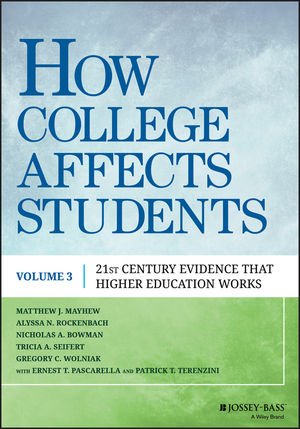 How College Affects Students
by
Nicholas A. Bowman; Tricia A. D. Seifert; Gregory C. Wolniak; Ernest T. Pascarella (As told to); Patrick T. Terenzini (As told to); Matthew J. Mayhew; Alyssa N. Rockenbach
Call Number: Hardcopy available through library ILL request. Naomi has a personal copy on the MTLE bookshelf - happy to lend it out.ISBN: 9781118462683Publication Date: 2016-09-19How College Affects Students synthesizes over 1,800 individual research investigations to provide a deeper understanding of how the undergraduate experience affects student populations. Volume 3 contains the findings accumulated between 2002 and 2013, covering diverse aspects of college impact, including cognitive and moral development, attitudes and values, psychosocial change, educational attainment, and the economic, career, and quality of life outcomes after college.
How College Affects Students
by
Nicholas A. Bowman; Tricia A. D. Seifert; Gregory C. Wolniak; Ernest T. Pascarella (As told to); Patrick T. Terenzini (As told to); Matthew J. Mayhew; Alyssa N. Rockenbach
Call Number: Hardcopy available through library ILL request. Naomi has a personal copy on the MTLE bookshelf - happy to lend it out.ISBN: 9781118462683Publication Date: 2016-09-19How College Affects Students synthesizes over 1,800 individual research investigations to provide a deeper understanding of how the undergraduate experience affects student populations. Volume 3 contains the findings accumulated between 2002 and 2013, covering diverse aspects of college impact, including cognitive and moral development, attitudes and values, psychosocial change, educational attainment, and the economic, career, and quality of life outcomes after college.
Antiracist and Decolonized Pedagogy
-
Diversity and Inclusion Are Not EnoughBenjamin D. Reese - Inside Higher Ed.
-
Practicing Anti-Racist PedagogyThis excellent resource out of the University of Michigan includes a wealth of information and resources for learning about and practicing antiracist pedagogy. We highly recommend exploring the "Critical & Anti-Racist Teaching Frameworks" bibliography included in this site.
-
Critical and Antiracist Teaching Frameworks BibliographyThis is a growing annotated bibliography curated by members of the University of Michigan Center for Research on Teaching and Learning.
-
Strategies for Antiracist and Decolonized TeachingThis Faculty Focus piece provides a succinct overview of five key areas of action. The aims of each are supplemented with a series of questions that guide faculty in the reflection and the recall of antiracist and decolonizing strategies. The references list at the bottom of the piece highlights a number of additional resources to explore.
Principles and Practices
-
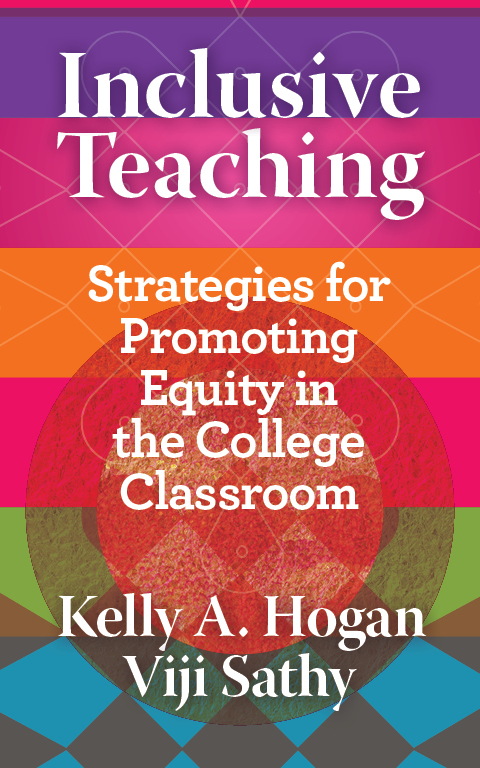 Inclusive Teaching
by
Kelly A. Hogan; Viji Sathy
Call Number: Full ebook availlable through the libraries.ISBN: 9781952271632Publication Date: 2022-08-01Kelly Hogan and Viji Sathy begin with a framework describing why explicit attention to structure enhances inclusiveness in both course design and interactions with and between students. Inclusive Teaching then provides practical ways to include more voices in a series of contexts: when giving instructions for group work and class activities, holding office hours, communicating with students, and more. The authors finish with an opportunity for the reader to reflect on what evidence to include in a teaching dossier that demonstrates inclusive practices.
Inclusive Teaching
by
Kelly A. Hogan; Viji Sathy
Call Number: Full ebook availlable through the libraries.ISBN: 9781952271632Publication Date: 2022-08-01Kelly Hogan and Viji Sathy begin with a framework describing why explicit attention to structure enhances inclusiveness in both course design and interactions with and between students. Inclusive Teaching then provides practical ways to include more voices in a series of contexts: when giving instructions for group work and class activities, holding office hours, communicating with students, and more. The authors finish with an opportunity for the reader to reflect on what evidence to include in a teaching dossier that demonstrates inclusive practices. -
 Culturally Inclusive Instructional Design
by
Charlotte Gunawardena; Casey Frechette; Ludmila Layne
Call Number: Hardcopy available through the libraries. Naomi has a personal copy on the MTLE bookshelf - happy to lend it out.ISBN: 9781138217867Publication Date: 2018-07-09Culturally Inclusive Instructional Design provides a framework for thinking about culture in digital learning, offering insight into how to build inclusive online communities that encourage reflection and growth, regardless of content domain.
Culturally Inclusive Instructional Design
by
Charlotte Gunawardena; Casey Frechette; Ludmila Layne
Call Number: Hardcopy available through the libraries. Naomi has a personal copy on the MTLE bookshelf - happy to lend it out.ISBN: 9781138217867Publication Date: 2018-07-09Culturally Inclusive Instructional Design provides a framework for thinking about culture in digital learning, offering insight into how to build inclusive online communities that encourage reflection and growth, regardless of content domain. -
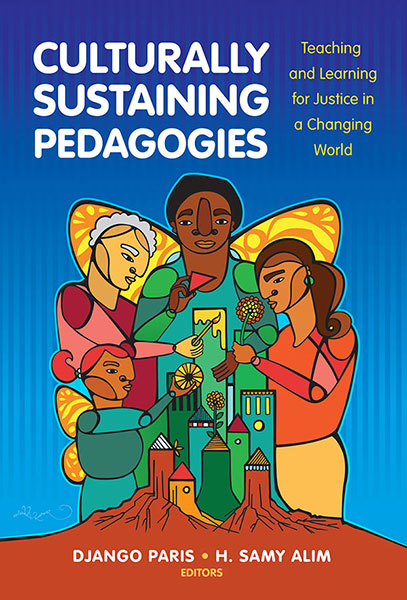 Culturally Sustaining Pedagogies
by
Django Paris (Editor); H. Samy Alim (Editor); Celia Genishi (Series edited by)
Call Number: Hardcopy available through the libraries.ISBN: 9780807758335Publication Date: 2017-05-30Prominent educators and researchers propose that schooling should be a site for sustaining cultural practices rather than eradicating them. Chapters present theoretically grounded examples of how schools can support Black, Indigenous, Latinx, Asian/Pacific Islander, South African, and immigrant students as part of a collective movement towards educational justice in a changing world.
Culturally Sustaining Pedagogies
by
Django Paris (Editor); H. Samy Alim (Editor); Celia Genishi (Series edited by)
Call Number: Hardcopy available through the libraries.ISBN: 9780807758335Publication Date: 2017-05-30Prominent educators and researchers propose that schooling should be a site for sustaining cultural practices rather than eradicating them. Chapters present theoretically grounded examples of how schools can support Black, Indigenous, Latinx, Asian/Pacific Islander, South African, and immigrant students as part of a collective movement towards educational justice in a changing world. -
 From Equity Talk to Equity Walk
by
Tia Brown McNair; Lynn Pasquerella (Foreword by); Estela Mara Bensimon; Lindsey Malcom-Piqueux
Call Number: Full ebook available through the libraries.ISBN: 9781119428725Publication Date: 2020-01-14This book offers practical guidance on the design and application of campus change strategies for achieving equitable outcomes. Drawing from campus-based research projects sponsored by the Association of American Colleges and Universities and the Center for Urban Education at the University of Southern California, this book provides real-world steps that reinforce primary elements for examining equity in student achievement while challenging educators to specifically focus on racial equity as a critical lens for institutional and systemic change.
From Equity Talk to Equity Walk
by
Tia Brown McNair; Lynn Pasquerella (Foreword by); Estela Mara Bensimon; Lindsey Malcom-Piqueux
Call Number: Full ebook available through the libraries.ISBN: 9781119428725Publication Date: 2020-01-14This book offers practical guidance on the design and application of campus change strategies for achieving equitable outcomes. Drawing from campus-based research projects sponsored by the Association of American Colleges and Universities and the Center for Urban Education at the University of Southern California, this book provides real-world steps that reinforce primary elements for examining equity in student achievement while challenging educators to specifically focus on racial equity as a critical lens for institutional and systemic change. -
 Equity-Centered Trauma-Informed Education (Equity and Social Justice in Education)
by
Alex Shevrin Venet
Call Number: UW-Madison doesn't have a copy of this text but it is available through ILL.ISBN: 9780393714739Publication Date: 2021-05-25Alex Shevrin Venet's text explores six principles of equity-centered, trauma-informed education. Although not focused specifically on higher-education contexts, the lenses and values this book highlights can help inform pedagogy at all levels.
Equity-Centered Trauma-Informed Education (Equity and Social Justice in Education)
by
Alex Shevrin Venet
Call Number: UW-Madison doesn't have a copy of this text but it is available through ILL.ISBN: 9780393714739Publication Date: 2021-05-25Alex Shevrin Venet's text explores six principles of equity-centered, trauma-informed education. Although not focused specifically on higher-education contexts, the lenses and values this book highlights can help inform pedagogy at all levels. -
Reach Everyone, Teach Everyone by Thomas J. Tobin; Kirsten T. Behling
Call Number: Full ebook & hardcopy available through the libraries.ISBN: 9781946684608Publication Date: 2018-10-01Reach Everyone, Teach Everyone is aimed at faculty members, faculty-service staff, disability support providers, student-service staff, campus leaders, and graduate students who want to strengthen the engagement, interaction, and performance of all college students. It includes resources for readers who want to become UDL experts and advocates: real-world case studies, active-learning techniques, UDL coaching skills, micro- and macro-level UDL-adoption guidance, and practical resources. -
Teaching for Diversity and Social Justice by Maurianne Adams (Editor); Lee Anne Bell (Editor)
Call Number: Full ebook available through the libraries.ISBN: 1138023345Publication Date: 2016-02-01Highlights theoretical foundations, pedagogical and design frameworks, and curricular models for social justice teaching practice.
Learners and Learning Contexts
-
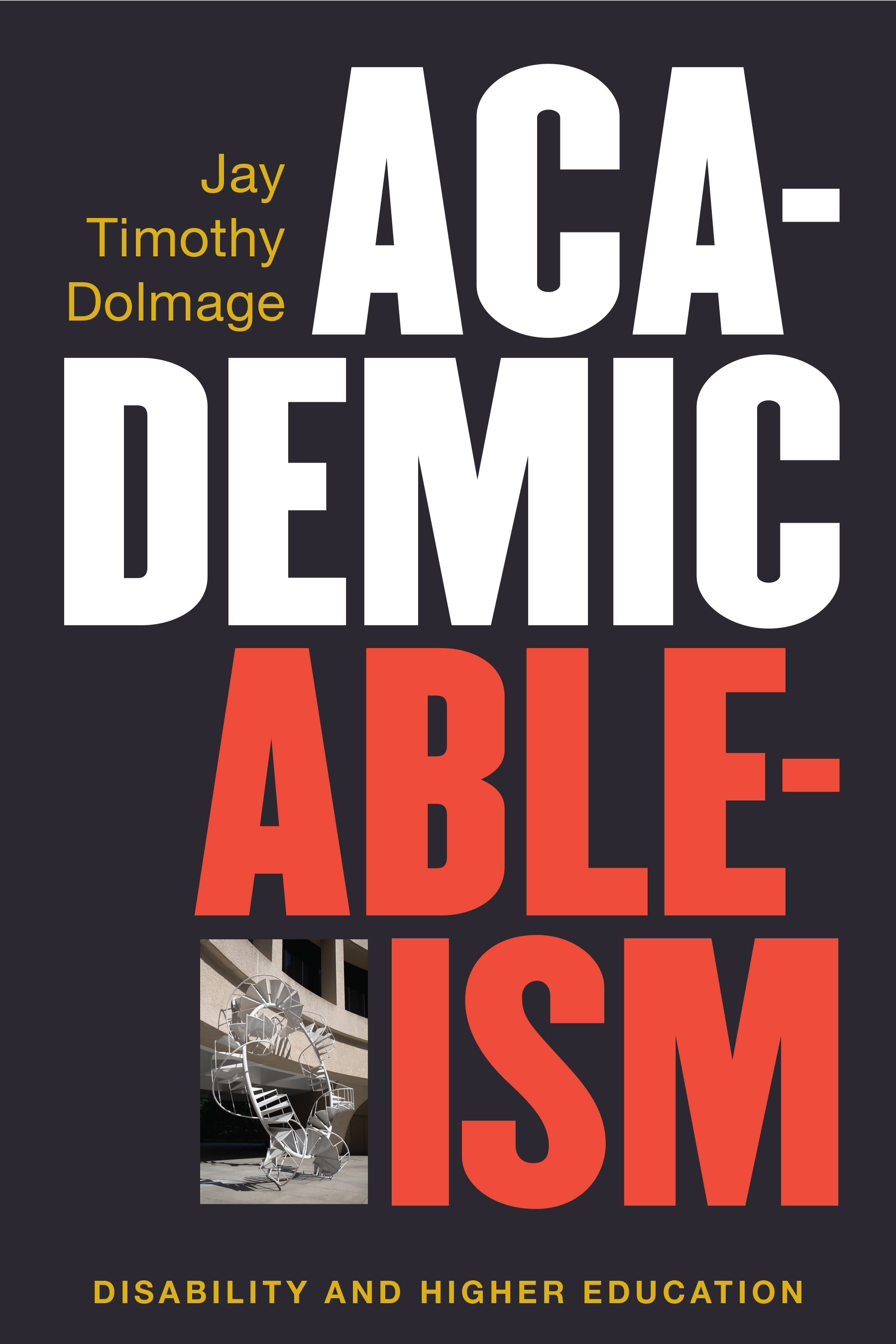 Academic Ableism: Disability in higher education
by
Jay T. Dolmage
Call Number: Full ebook & hardcopy available through the libraries.ISBN: 9780472900725Publication Date: 2017-12-05Academic Ableism brings together disability studies and institutional critique to recognize the ways that disability is composed in and by higher education, and rewrites the spaces, times, and economies of disability in higher education to place disability front and center.
Academic Ableism: Disability in higher education
by
Jay T. Dolmage
Call Number: Full ebook & hardcopy available through the libraries.ISBN: 9780472900725Publication Date: 2017-12-05Academic Ableism brings together disability studies and institutional critique to recognize the ways that disability is composed in and by higher education, and rewrites the spaces, times, and economies of disability in higher education to place disability front and center. -
 Affirming LGBTQ+ Students in Higher Education
by
edited by David P. Rivera, Roberto L. Abreu, Kirsten A. Gonzalez
Call Number: Full ebook available through the librariesISBN: 9781433833335Publication Date: 2022
Affirming LGBTQ+ Students in Higher Education
by
edited by David P. Rivera, Roberto L. Abreu, Kirsten A. Gonzalez
Call Number: Full ebook available through the librariesISBN: 9781433833335Publication Date: 2022 -
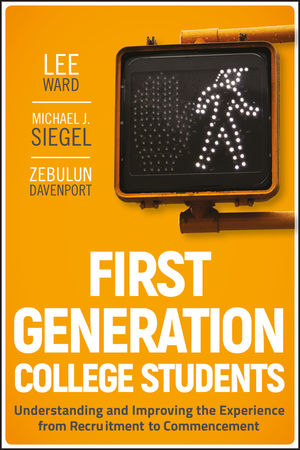 First-Generation College Students: understanding and improving the experience from recruitment to commencement
by
Lee Ward; Michael J. Siegel; Zebulun Davenport
Call Number: Full e-book available through the libraries.ISBN: 1118220277Publication Date: 2012-06-06A summary of scholarship on how to effectively recruit, educate, develop, retain, and ultimately support first-generation students through to graduation.
First-Generation College Students: understanding and improving the experience from recruitment to commencement
by
Lee Ward; Michael J. Siegel; Zebulun Davenport
Call Number: Full e-book available through the libraries.ISBN: 1118220277Publication Date: 2012-06-06A summary of scholarship on how to effectively recruit, educate, develop, retain, and ultimately support first-generation students through to graduation. -
Native Presence and Sovereignty in College by Amanda R. Tachine
Call Number: Full ebook available through the libraries.ISBN: 0807766143Publication Date: 2022-04-30Diné/Navajo scholar Amanda Tachine follows 10 Diné/Navajo teenagers' experiences during their last year in high school and into their first year in college. Tachine explores systemic mechanisms that hurt Native students' chances of earning a degree, describing these mechanisms as systemic monsters. This book addresses the nature of those monsters and details the Indigenous weapons that students use to defeat them. This book is one of the first of an emerging Culturally Sustaining Pedagogies series. -
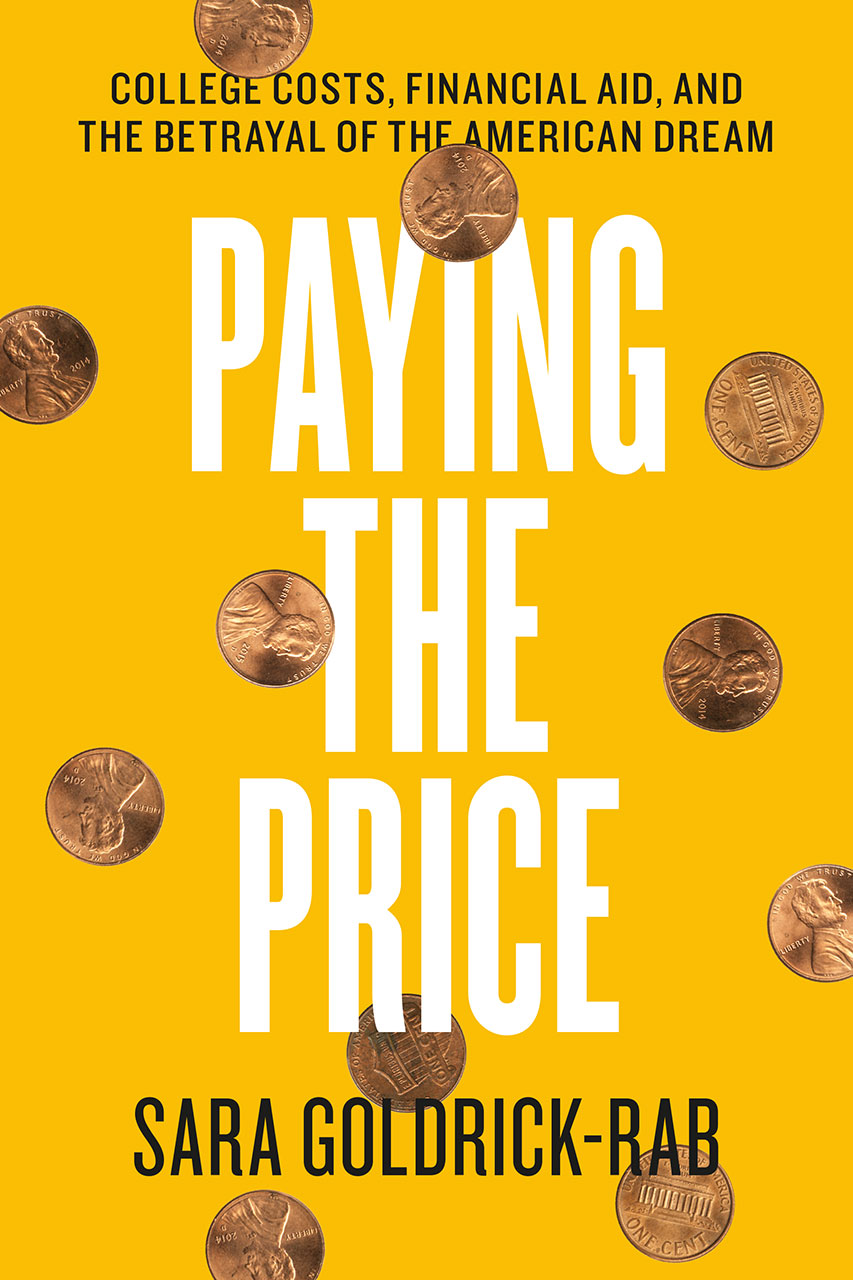 Paying the Price
by
Sara Goldrick-Rab
Call Number: Full ebook available and downloadable through the libraries. Hardcopy also available.ISBN: 9780226404486Publication Date: 2016-09-01Drawing on a study of 3,000 young adults who entered public colleges and universities in Wisconsin in 2008 with the support of federal aid and Pell Grants, Sara Goldrick-Rab explores the challenges of navigating high costs of college education in the US.
Paying the Price
by
Sara Goldrick-Rab
Call Number: Full ebook available and downloadable through the libraries. Hardcopy also available.ISBN: 9780226404486Publication Date: 2016-09-01Drawing on a study of 3,000 young adults who entered public colleges and universities in Wisconsin in 2008 with the support of federal aid and Pell Grants, Sara Goldrick-Rab explores the challenges of navigating high costs of college education in the US. -
 Student Veterans and Service Members in Higher Education
by
Jan Arminio; Tomoko Kudo Grabosky; Josh Lang
Call Number: Hardcopy available through the libraries.ISBN: 9780415739726Publication Date: 2014-12-16This book explores the facilitators and barriers of student veteran learning and engagement, how culture informs the current student veteran experience, and best practices for creating and maintaining a campus that allows for the success of student veterans and servicemembers.
Student Veterans and Service Members in Higher Education
by
Jan Arminio; Tomoko Kudo Grabosky; Josh Lang
Call Number: Hardcopy available through the libraries.ISBN: 9780415739726Publication Date: 2014-12-16This book explores the facilitators and barriers of student veteran learning and engagement, how culture informs the current student veteran experience, and best practices for creating and maintaining a campus that allows for the success of student veterans and servicemembers. -
Trans* in College by Z. Nicolazzo
Call Number: Full ebook and hardcopy available through the libraries.ISBN: 1620364581Publication Date: 2016-11-29This book is addressed as much to trans* students themselves as it is to faculty, student affairs professionals, and college administrators, opening up the implications for the classroom and the wider campus. This book distills literature on trans* college students and does so from a perspective of resiliency and agency. Rather than situating trans* students as problems requiring accommodation, this book problematizes the college environment and frames trans* students as resilient individuals capable of participating in supportive communities and kinship networks, and of developing strategies to promote their own success.